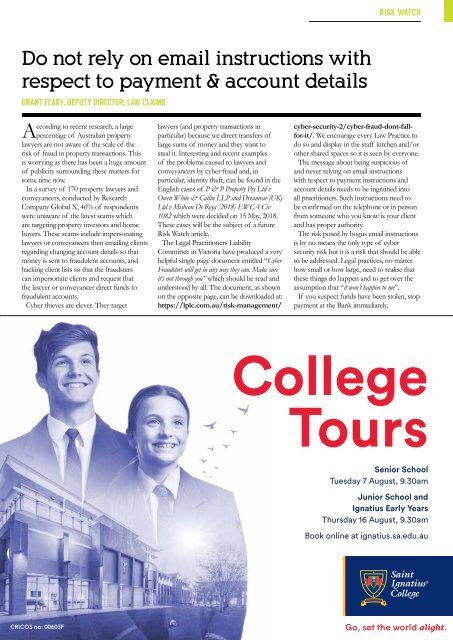LSB July 2018_Web
You also want an ePaper? Increase the reach of your titles
YUMPU automatically turns print PDFs into web optimized ePapers that Google loves.
RISK WATCH<br />
Do not rely on email instructions with<br />
respect to payment & account details<br />
GRANT FEARY, DEPUTY DIRECTOR, LAW CLAIMS<br />
According to recent research, a large<br />
percentage of Australian property<br />
lawyers are not aware of the scale of the<br />
risk of fraud in property transactions. This<br />
is worrying as there has been a huge amount<br />
of publicity surrounding these matters for<br />
some time now.<br />
In a survey of 170 property lawyers and<br />
conveyancers, conducted by Research<br />
Company Global X, 46% of respondents<br />
were unaware of the latest scams which<br />
are targeting property investors and home<br />
buyers. These scams include impersonating<br />
lawyers or conveyancers then emailing clients<br />
regarding changing account details so that<br />
money is sent to fraudulent accounts, and<br />
hacking client lists so that the fraudsters<br />
can impersonate clients and request that<br />
the lawyer or conveyancer direct funds to<br />
fraudulent accounts.<br />
Cyber thieves are clever. They target<br />
lawyers (and property transactions in<br />
particular) because we direct transfers of<br />
large sums of money and they want to<br />
steal it. Interesting and recent examples<br />
of the problems caused to lawyers and<br />
conveyancers by cyber-fraud and, in<br />
particular, identity theft, can be found in the<br />
English cases of P & P Property Pty Ltd v<br />
Owen White & Catlin LLP and Dreamvar (UK)<br />
Ltd v Mishcon De Reya [<strong>2018</strong>] EWCA Civ<br />
1082 which were decided on 15 May, <strong>2018</strong>.<br />
These cases will be the subject of a future<br />
Risk Watch article.<br />
The Legal Practitioners Liability<br />
Committee in Victoria have produced a very<br />
helpful single page document entitled “Cyber<br />
Fraudsters will get in any way they can. Make sure<br />
it’s not through you” which should be read and<br />
understood by all. The document, as shown<br />
on the opposite page, can be downloaded at:<br />
https://lplc.com.au/risk-management/<br />
cyber-security-2/cyber-fraud-dont-fallfor-it/.<br />
We encourage every Law Practice to<br />
do so and display in the staff kitchen and/or<br />
other shared spaces so it is seen by everyone.<br />
The message about being suspicious of<br />
and never relying on email instructions<br />
with respect to payment instructions and<br />
account details needs to be ingrained into<br />
all practitioners. Such instructions need to<br />
be confirmed on the telephone or in person<br />
from someone who you know is your client<br />
and has proper authority.<br />
The risk posed by bogus email instructions<br />
is by no means the only type of cyber<br />
security risk but it is a risk that should be able<br />
to be addressed. Legal practices, no matter<br />
how small or how large, need to realise that<br />
these things do happen and to get over the<br />
assumption that “it won’t happen to me”.<br />
If you suspect funds have been stolen, stop<br />
payment at the Bank immediately.<br />
College<br />
Tours<br />
Senior School<br />
Tuesday 7 August, 9.30am<br />
Junior School and<br />
Ignatius Early Years<br />
Thursday 16 August, 9.30am<br />
Book online at ignatius.sa.edu.au<br />
CRICOS no: 00603F<br />
Go, set the world alight.


















